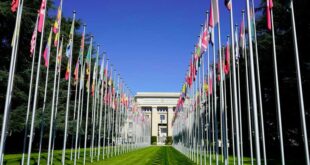NATO and the European Umopm can be compatible, as long as real security requirements and responsible action—not political agendas—drive cooperative efforts.
Question: What’s the number one immediate threat to the peace and stability of the transatlantic community?
Answer: Vladimir Putin’s belief that he has veto power over how free nations exercise collective security.
The sooner the United States and its NATO allies put stake in that notion, the sooner we can look to a secure future and start working out a stable and sustainable relationship with Russia. Constructive approaches to burden-sharing; NATO enlargement; strategic deterrence, and China—all need to be on the agenda.
From Russia Without Love
There is no shortage of proposals for how to “reset” yet again the West’s relations with Russia, but all share a common flaw: they are based on dealing with the Russia we want, not the Russia we have.
The Russia we want is a country run by a leader who is willing to be reasonable. The Russia we have has zero interest in living side-by-side in peace and prosperity. Putin is greedy, mistrustful, and untrustworthy, intent on perpetuating his power by undermining the solidarity of the transatlantic community and extending his influence by controlling his neighbors.
The strengths and limits of Russian power are clear. While there is internal dissent, Putinism has a stranglehold over Russia. The economy sputters along. Nevertheless, Putin has husbanded sufficient resources to improve the military and maintain an activist foreign policy in concert with disinformation and malicious active measures. In addition, Putin has tried to leverage Russia’s relationship with China.
In the end, Putin is opportunistic and has sufficient power to keep trying to shape the international environment in ways that create new opportunities for himself and challenges for the West. His clear preference is to win without fighting; ever ready to bluster, intimidate, and undermine, he will use naked force only when conditions suggest he can get away with it.
Putin bears many of the attributes of previous strongmen who have ruled Russia. He sees concessions and gestures as signs of weaknesses or covers for subterfuge. Hence, the West should never give the Russians something for nothing.
At the same time, Putin is hamstrung by the system he created. He can use the framework of Putinism to perpetuate his power, but dare not overreach—or over-reform—lest the whole thing unravel. In other words, Putin has his limits. All this suggests that Putin is a problem to be managed. The challenge is to keep his disruptive impulses at bay, through a combination of resilient deterrence and wary co-existence and engagement.
The Stiff Arm and the Outreached Hand
In strategy, sequencing matters. It is clear that Putin doesn’t fully understand that Europe is hands-off to Moscow until the Russians are willing to: engage in civil dialogue; conduct responsible, transparent free-market business practices; and respect the rule of law, human rights and national sovereignty.
The agenda for the next NATO meeting has no mega-items listed, nor are any likely to be added before the December get-together. That’s actually fine. The next steps NATO needs to take can’t be accomplished in a fly-in.
Burden-Sharing
NATO needs to continue to demonstrate its commitment to collective defense. Nothing will send a stronger signal to Putin than if every nation has its full allotment of skin in the game—i.e., by fulfilling all its obligations to the alliance.
The London meeting offers members the opportunity to make a serious commitment to put meat-on-the-bones of the 30-30-30-30 plan, which requires NATO to have 30 battalions, 30 fighter squadrons and thirty ships ready to deploy within 30 days. This initiative would address both capacity and readiness issues, seriously enhancing the credibility of the alliance’s conventional deterrence. If the allies dedicated themselves to these goals, then the debates and finger-pointing over minimum funding and objective levels would likely be de-politicized and resolve themselves. Instead, leaders could focus on the concrete capabilities that will attract Putin’s attention.
NATO Enlargement
The real work starts after London. The alliance needs to go beyond saying the door is always open; it needs to start talking about how aspirant nations will be added. This starts with Georgia.
As NATO Secretary-General Jens Stoltenberg said in 2016, “Georgia has all the practical tools to become a member of NATO.” Other NATO leaders, including the U.S. president, should start saying the exact same thing. That would send a strong signal. This message also makes the case that requiring a Membership Action Plan (MAP), which NATO still has not developed for Georgia, isn’t a necessary next step. Indeed, other countries have joined NATO without a MAP.
Process shouldn’t hold up progress. And an open-ended process results in no meaningful progress at all. It is time for the United States to lead and put a mark on the wall: the year 2022 makes sense. It gives all parts of Georgia’s political spectrum more than enough time to end the current political turmoil and come together to demonstrate a national commitment to democratic practices. And it gives the United States and others a reasonable amount of time to make the case for Georgian membership.
If Donald Trump is reelected, then Georgian membership offers him an opportunity to cement his leadership in the transatlantic community—not only by strengthening the alliance through his commitment to burden-sharing but by demonstrating his faith in the principle of collective defense. Equally importantly, it would demonstrate that the U.S. desire to see relations with Russia normalized will never come at the expense of the interests of the alliance. A strong alliance is a prerequisite for stable long-term relations. Taking Georgia off the table as a bargaining chip between East and West just takes one more irritant out of relations between Russia and Europe.
On the other hand, if the 2020 elections usher in a new administration, the new president could get off to a strong start by pushing for Georgian entry into NATO, thereby demonstrating his or her belief in NATO as a key alliance for years to come.
If ever there was a time for a strong bipartisan initiative demonstrating American leadership in the alliance, then Georgia provides the opportunity.
Strategic Deterrence
Now that the United States has withdrawn from the Intermediate-Range Nuclear Forces treaty, it is time for America and its allies to start closing the gap in extended deterrence. Beyond taking a unified approach to countering the Russian intermediate-range nuclear missiles that threaten Europe, NATO members need to work together for a broader, more comprehensive and more effective arms control regime that includes Moscow and Beijing.
Meanwhile, the alliance needs to continue to invest in missile defense. A credible conventional and nuclear deterrence, effective missile defense, and cooperative arms control provide the most stable strategic environment to minimize the threat of nuclear conflict.
China
China has to be part of NATO’s Russia calculus. The alliance need not delve too deeply into the affairs of the Indo-Pacific region, but NATO members do need to be concerned about how Chinese influence, investments, and operations in the transatlantic area of operations could impact or undermine the collective defense of the alliance.
In particular, given the relationship between Russia and China, the alliance can’t discount the possibility that China will collect intelligence or conduct activities that supplement Moscow’s efforts to destabilize its neighbors or undermine the alliance.
The China problem is something that is better addressed through consultations, training and exercises rather than by creating a NATO-China counsel. Indeed, the alliance has to be wary of engagement, including bilateral exercises, exchanges and engagement by individual members which ought to also assess risks to the alliance as well as their own countries.
This is one area where the NATO and the European Union need to develop more effective partnerships. Many potential challenges from China—including trade and political warfare—transcend traditional military threats. Frankly, NATO and EU could use some initiatives to build trust and confidence rather than foster competition.
It is past time for using transatlantic security policy as a surrogate for debates over European integration, competition with the United States or squabbling between states. Though some may cherish the notion of autonomous European security, it is impractical. The chief external security threats to Europe are the destabilizing actions of Russia; the problems of the Middle East spilling over into Europe; and the encroaching influence of Beijing—and these issues are increasingly intertwining themselves. Europe is incapable of addressing these concerns out of the context of the transatlantic community.
The futures of the United States, Canada, and Europe are not autonomous. NATO and the EU can be compatible, as long as real security requirements and responsible action—not political agendas—drive cooperative efforts. China is a problem that demands cooperation and collaboration among all parties.
A Heritage Foundation vice president, James Jay Carafano directs the think tank’s research on matters of national security and foreign affairs.
Image: Reuters
 Geostrategic Media Political Commentary, Analysis, Security, Defense
Geostrategic Media Political Commentary, Analysis, Security, Defense





